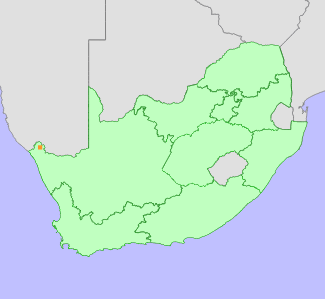|
Scientific Name | Hesperantha eremophila Goldblatt & J.C.Manning |
Higher Classification | Monocotyledons |
Family | IRIDACEAE |
National Status |
Status and Criteria | Vulnerable D2 |
Assessment Date | 2021/05/27 |
Assessor(s) | P.C.V. Van Wyk, L. von Staden & T. Patel |
Justification | This species has an extent of occurrence (EOO) and area of occupancy (AOO) of 12 km². It is known from one location, where plants are potentially threatened by overgrazing. It is therefore listed as Vulnerable under criteria D. |
Distribution |
Endemism | South African endemic |
Provincial distribution | Northern Cape |
Range | It is endemic to South Africa, and is restricted to the slopes of the Vandersterrberg in the Richtersveld National Park in Northern Cape. |
Habitat and Ecology |
Major system | Terrestrial |
Major habitats | Central Richtersveld Mountain Shrubland, Stinkfonteinberge Quartzite Fynbos |
Description | It occurs in shaded, seasonally moist sites along seepages in rock crevices and at the foot of sandstone and conglomerate rock slabs. |
Threats |
| This species is localized to the central Richtersveld mountains, where grazing pressure is currently low. However, as rangelands on the plains and closer to settlements are becoming increasingly degraded, herders are starting to move their livestock into the mountains in search of grazing. A livestock outpost has already been established in the valley where this species was recently discovered. It is therefore potentially threatened by overgrazing. |
Population |
This species is localized to a sheltered valley, where it occurs in moist areas where it is dependent on water seeping from rock sheets above it. It is currently known from a single, stable subpopulation, but possibly occurs elsewhere in the central mountains of the Richtersveld, parts of which are remote and botanically still poorly explored. This type of habitat is however rare in the Richtersveld, and this species is unlikely to be common. It possibly only flowers in years of high rainfall, and may be easily overlooked.
|
Population trend | Stable |
Assessment History |
Taxon assessed |
Status and Criteria |
Citation/Red List version | | Hesperantha eremophila Goldblatt & J.C.Manning | VU D2 | 2015.1 | |
Bibliography |
Goldblatt, P. and Manning, J.C. 2020. Iridaceae of southern Africa. Strelitzia 42. South African National Biodiversity Institute, Pretoria.
Goldblatt, P., Manning, J.C. and Van Wyk, P.C.V. 2015. New species, combinations and range extensions in Hesperantha Ker Gawl. (Iridaceae: Crocoideae) from western South Africa. South African Journal of Botany 98:114-121.
|
Citation |
| Van Wyk, P.C.V., von Staden, L. & Patel, T. 2021. Hesperantha eremophila Goldblatt & J.C.Manning. National Assessment: Red List of South African Plants version 2024.1. Accessed on 2026/01/25 |
 Comment on this assessment
Comment on this assessment

